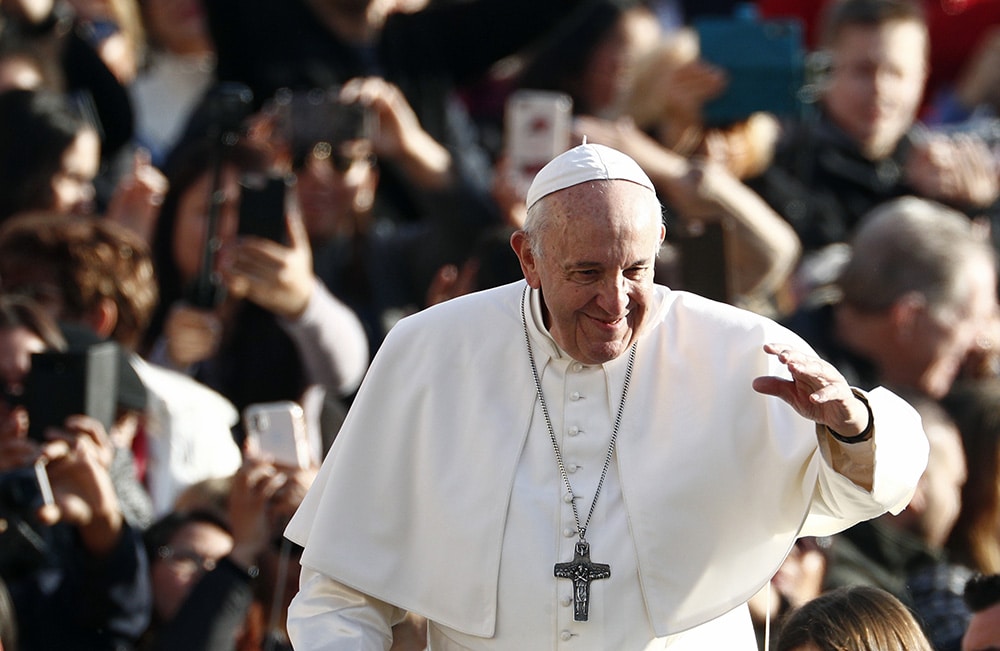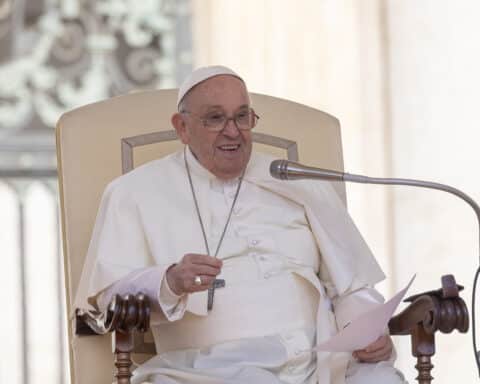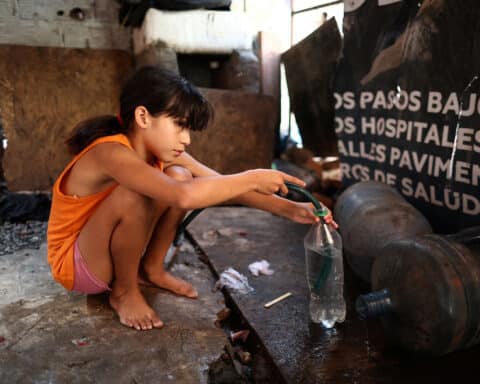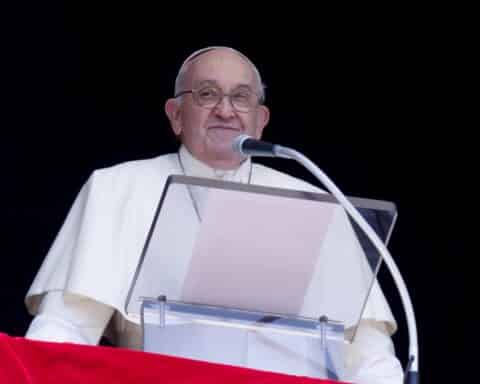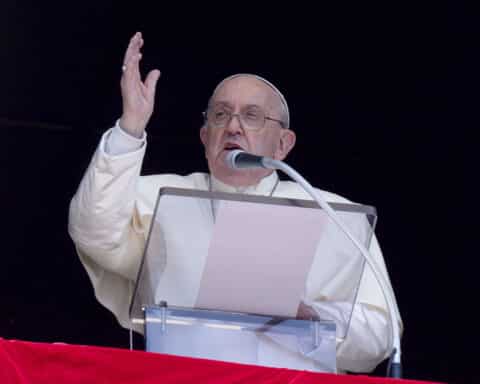If the world was expecting Pope Francis to slow down with age — he turned 83 in late December — it certainly didn’t happen in 2019. Last year saw him make seven apostolic trips outside of Italy — a high for his pontificate — that included a January visit to Panama to celebrate World Youth Day and weeklong trips to Africa (Madagascar, Mauritius and Mozambique) and Asia (Thailand and Japan). He also attended the Vatican’s February summit on the protection of minors and October’s Synod of Bishops on the Amazon, released the post-synodal apostolic exhortation Christus Vivit and continued working toward reforming the Roman Curia. It was a busy year.
How will he follow it up in 2020, the eighth year of his pontificate?
While there are few official confirmations, and much remains subject to change, Pope Francis will continue to focus on his well-established priorities — namely, showing those on the peripheries, especially the poor, persecuted and marginalized, Christ’s love and the Church’s closeness to them.
Likely — and unlikely — trips
In separate events at the Vatican during 2019, he told audiences that he wished to visit South Sudan and Iraq in the coming year. So far, neither trip has been able to come to fruition, as both trips have been held back because of safety concerns. However, he repeatedly has stressed his wish to go to the African country that has been working toward, even if in baby steps, peace and reconciliation following a tumultuous civil war that has claimed at least 400,000 lives, and how he would like to travel there along with Archbishop Justin Welby of Canterbury, the Primate of the Anglican Church, for an ecumenical prayer for peace.
It would be almost impossible to forget the moving moment when rival leaders of South Sudan participated in a spiritual retreat in the Vatican, along with Archbishop Welby. In an unexpected and unforgettable gesture at the end of the meeting, Pope Francis, despite the clear physical exertion it required, kneeled down on the floor, kissing their feet and pleading for peace.
If the security concerns can be overcome and there are not excessive political tensions with the newly instituted government, Pope Francis likely will make a one-day trip to the country, much like his day trip to the civil-war struck Central African Republic in 2015.
Looking toward Iraq, the pope told an audience in the Vatican on Pentecost that he planned to visit the Middle Eastern country in 2020. So far, despite other official visits there by dignitaries in the Vatican, including Secretary of State Cardinal Pietro Parolin, Iraq has not been safe enough for the pope to visit. This changed recently, and a trip was expected early in 2020. However, now with the recent mass anti-government protests that flared up back in October — particularly against corruption, bad public services, unemployment and Iran’s influence — the trip could be in jeopardy.
Despite Pope Francis’ words to the contrary earlier this year, he will not go to his native land of Argentina in 2020. Despite originally saying to a journalist this year he would go, in November on the flight to Thailand, he was asked about returning to his homeland, and Francis pointed up, saying, “Only the Lord knows.” This trip continues to be delayed for political reasons: a papal trip is not seen as appropriate when the pontiff’s presence seems to be supporting one political party, or as a move to criticize another.
Other expected trips are to Cyprus and Lebanon, even if not confirmed yet. Cyprus’ President Nicos Anastasiades said this November that next year Francis will visit, and his arrival will coincide with the republic’s 60-year anniversary of independence.
In Europe, there is talk about a papal visit to Montenegro and Hungary, whose capital of Budapest will host the Eucharistic Congress in 2020. Looking toward Asia, Vatican officials said that East Timor could be a possible destination for the pope in the coming year. A majority of the inhabitants in the former Portuguese colony, which gained its independence in 1999, are Catholic. A trip to Indonesia eventually could happen, even if not this year, in the near future. While the Pope expressed on the return flight from Japan and Thailand that he would love to go to China, that travel, along with one to Russia, is not expected in the near future because of China’s restrictions on religious liberty and freedom of the press, and, for Russia, because of its aggression in Ukraine.
Other priorities
Aside from trips abroad, Pope Francis continues to have his work cut out for him without leaving the Vatican. In continued efforts to reform, Francis is committed to restructuring the Roman Curia to be more effective and meaningful to the universal Church. Although the work has been long and tiring, in 2020 the long-awaited publication of Praedicate Evangelium, the apostolic constitution which will redesign the entire structure of the Roman Curia, is expected to be published.
New papal documents have been speculated, but the only definitive one, expected before March, is the apostolic exhortation following the regional Synod of Bishops on the Amazon, which took place in the Vatican this past October.
What will be truly historical will be the pope’s opening of the archives on Pope Pius XII, the debated World War II pope. Many historians have proven that despite what many call his silence about Hitler and the Shoah, he saved hundreds of thousands of Jews acting behind the scenes, hiding many in the Vatican. Unfortunately, his pontificate remains disputed, but this gesture to open the archives — despite much resistance over the years — will remain a milestone. The Vatican announced in 2019 that the archives will be open to scholars beginning in March.
Pope Francis also continues meeting survivors of clerical sexual abuse privately and regularly in order to better understand how to tackle the crisis and change mentalities so that future such cases worldwide become fewer and fewer. After the unexpected document published Dec. 17 abolishing the pontifical secret for cases of sexual violence and child abuse committed by clerics, May 2020 will be an important deadline. According to Vos estis lux mundi, his letter issued motu proprio, May is the deadline to establish in every Catholic diocese of the world “one or more public, stable and easily accessible systems for submission of reports [concerning cases of sexual violence and sexual abuse by clerics], even through the institution of a specific ecclesiastical office.”
Pope Francis will work toward cleaning up financial scandals in the Vatican. The office of Prefect of the Secretariat for the Economy remained vacant for a long time, as Cardinal George Pell’s term expired in February while he was facing a controversial trial in Australia for alleged child abuse. On Nov. 14, Francis appointed Father Juan Antonio Guerrero Alves, a Spanish Jesuit with a good reputation for administration, to replace Cardinal Pell.
Starting on May 14, Pope Francis will launch a global educational pact that will bring together world leaders and young people. Given today’s rapid technological growth and computerization, Francis lamented that points of reference have been lost in the process, and for this reason, “like never before,” such a broad educational alliance is needed. According to a press release from the Vatican’s Congregation for Education, published last September, the event will help mark the fifth anniversary of Pope Francis’ encyclical on human ecology, Laudato Si’.
What remains certain beyond these hypotheses and expectations, is that Pope Francis will keep trying to live the beatitudes, to show Christ’s love for the people and hold close to his convictions and take Christ’s message to the ends of the earth.
Deborah Castellano Lubov writes from Rome.

